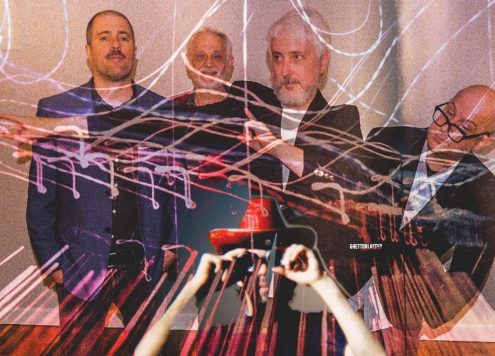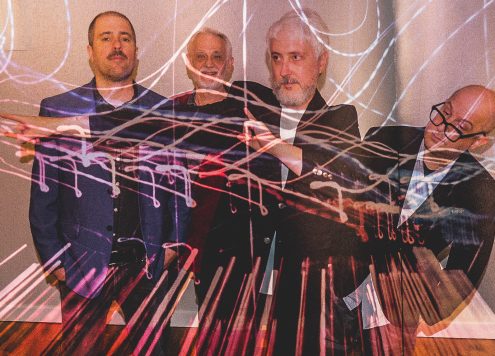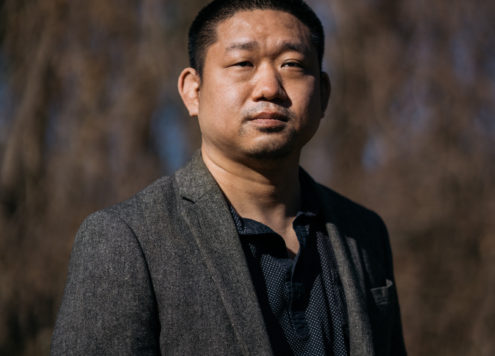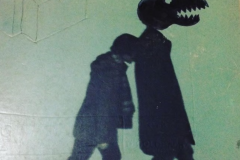Andrew Choi, the songwriter behind St. Lenox is an unconventional modern musician. A classical trained violinist from Juilliard, he turned to modern indie music in an effort to discover new sounds. However indie music’s tenuous but still holding on relationship to money has led to a creative stagnation, which keeps him at arm’s length from his peers.
Choi also has a doctoral degree in philosophy and a law degree with which he works at a firm in New York City, not the typical day job for someone in a band playing bars across the country.
His father immigrated from South Korea, which gives him a view on both cultures, though through the lens of each. He was raised in the Midwest and now lives in New York City, another cultural shift.
All of this and more pours into Choi’s music. For his latest album, Ten Fables of Young Ambition and Passionate Love, he remembers his drives, both personally and professionally. He is the only one who could have created this album, which takes nothing away from how identifiable it is to many of us who have occupied similar shifting spaces in this modern era.
Ghettoblaster: You have a remarkable set of credentials for playing music on the level that you do. What do you get out of it and what keeps you recording and performing?
Andrew Choi: I mean, I think I’m trying to write the new music? I guess it’s a concept that’s fallen out of fashion over the past few decades. I became familiar with it as a classical musician, and playing my way through the history of Western music, but you see over decades or parts of centuries, people engaging in music writing as a bona fide act of discovery. I think that’s changed more recently. I was talking to someone the other day about how the vast majority of even big indie releases would have been very comfortable in 2005, and how surprising that is. I suppose I’ve been trying to recreate that feeling of discovery in music again. The idea of writing as an act of discovery. I’m not sure what caused the lapse – I think it’s a combination of “indie” becoming corporatized over that same period, and financial barriers being instituted to gaining indie legitimacy. I listen to the big indie releases being put out, and my first thought is usually, “I can see myself listening to this in 2005.” It’s a little depressing.
Besides that, I think it’s important to try and have Asian-American artists putting out work with significant artistic merit. There’s this tension going on in the Asian-American community – on the one hand we want a distinct artistic identity, but on the other hand we want generic mainstream pop stars, and I think a lot of people lean heavily towards the latter. I mean, this just mirrors the general struggle of artists in general – and I get it. Investment in non-mainstream art is very difficult, especially when you are in a group that is heavily discriminated against and has no representation. I totally get that. But I’m in it for longer term results, and as such, I’m going to just keep doing my own thing for a while, because I think it can have longer term payoff for the community.
GB: How do your coworkers at the law firm react to your music career? I have to imagine it’s pretty unusual sideproject for the field you’ve chosen.
AC: Oh, I think generally the way your parents would to your music career. Generally very supportive, but you wouldn’t want your parents writing you like a fan letter. That would be weird. They are exactly as supportive as you would want someone to be if you had an existing professional relationship with them.
GB: I also imagine working in a law firm and performing as an indie musician has you circulating with people that might never interact. Have you thought about that at all as social media seems to have most of us retreating deeper into our reflective communities?
AC: I think there’s actually something to keeping them separated. People end up where they are because of their comfort level with their surroundings. Especially when people get older, they actually don’t really like interacting with different people. Have you ever had a party where you invited people from different circles? You know how that turns out. I don’t need to tell you. Social media exacerbated that tendency, but it’s always been there. You need institutions to bring people together – weddings, public schools, block parties, open mics. I am not an institution – I don’t have that kind of power. I mean, I interact with a lot of different people as a musician, but that’s more of a skill in speaking several different social languages, as it were.
GB: Do you see yourself as kind of an ambassador for the differing groups that you both identify with? Do you feel hopeful that culture could become less segregated and insular?
AC: I mean, if an ambassador is an elected office, then no. I think I’m really not viewed as an “ideal” representative by any group, really. You can ask them about that, don’t ask me. Am I hopeful that culture could become less segregated and insular? Yes. Do I think my music is going to do that on a popular level? Of course not. The two groups that I seem to appeal to most are grad students and working comedians – so not a huge following. Do I think I can help willing listeners think about the world around them in more humanistic ways? Yes.
GB: In a recent interview you mentioned having aspirations to put out music that explores every day life in America. Can you talk a little more about this and why you see music as your preferred medium for this expression?
AC: I think political writing is important. I think most political writing turns out to be what I’ll call red meat. Red meat is designed to give the soldiers courage to do battle. Red meat is also hopelessly obvious – and it doesn’t need to be anything other than that because it energizes existing motivations. Red meat can say things like “Trump is an idiot!” in song form – which while indubitably true, is nevertheless a way of courage boosting. I don’t mean to denigrate red meat, because I think it’s a very important in politics, and there’s I’m sure a long history of music as a form of red meat. But red meat is not all political writing. I’m more interested in telling stories as a way of seeing value in every day human life, because I think there is significant moral value there, and I think it is inherently morally motivating. Music is just a tool that helps uncover and reflect those values into the minds of listeners, and if I’m successful, it makes them see the moral value in others and maybe affects how they move on from there. At least that’s what I aim for. I’m not going to write a song that just directly tells people “virtual reality is an attractive but empty facsimile of real life!”. That would be red meat, and it would be a very very dumb song.
GB: Music can be a great way for us to understand and empathize with the artist, does it feel like we’re broadly only experiencing a small sliver of existence because of the lack of artistic ambition of so many other groups?
AC: I don’t think it’s a matter of lack of ambition. I think it’s a matter of music education that gives people the skills to develop bigger visions for music writing. I think it’s also a matter of music journalism finding a better business model because the word on the street is that the market for exposure has tightened considerably. All the new big indie “discoveries” lately are being sourced from a handful of entities, and the costs of exposure are significant. Separate from the cost of making the actual music, it costs I’m sure over $10K to get “discovered” these days. But I mean, Exeter isn’t saying they “discovered” all of these new students that are attending this year, right? There’s something false about how the term “discovery” is used here. Exeter doesn’t call itself a public school because it’s not in fact open to the public. So should we still call it “indie” music? And if there’s financial and social privileges playing a role in what music is heard, would you expect as a listener that your exposure to the world of music is big or small?
GB: Do you have a hard time enjoying music that isn’t as biographical or true to real life situations? Is it similar to a preference of non-fiction over fiction in literature?
AC: Not really, but I mean I think the best fiction is something that still has a strong connection to real life.
Facebook | Twitter | Website
Photo: Andrew Choi











Social Media